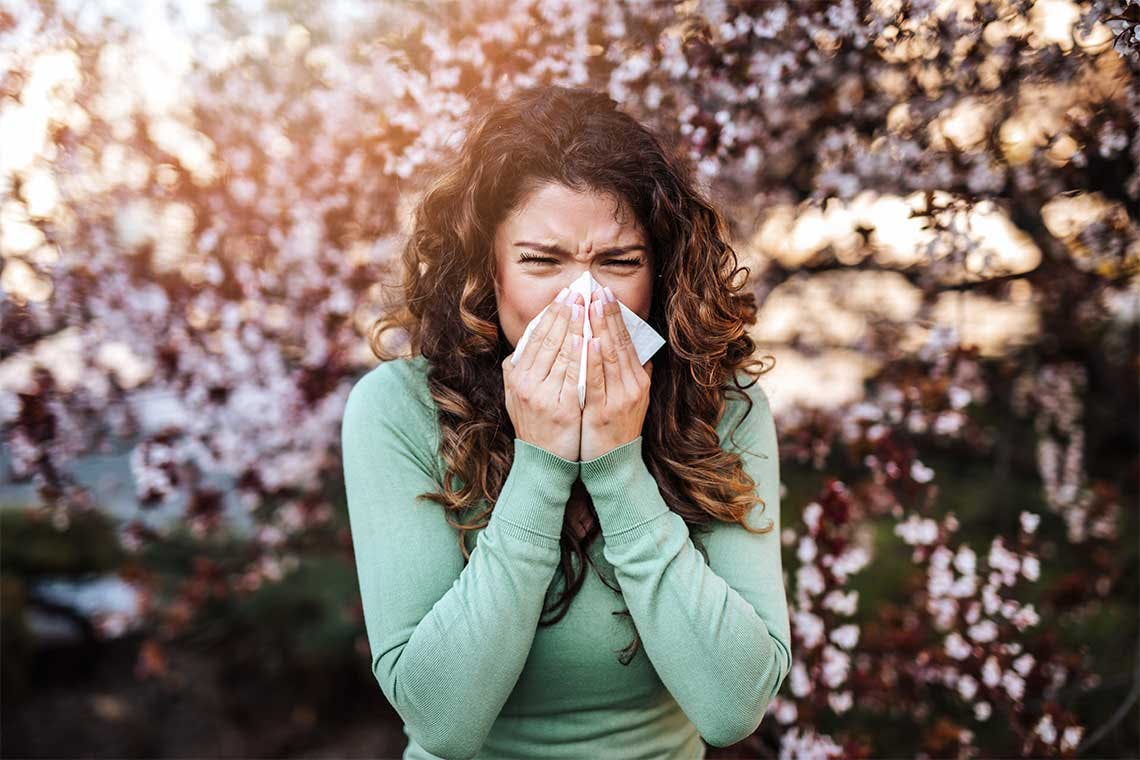
When Is Peak Allergy Season?
When allergy season comes around, you’re due for a slew of symptoms like coughing, sneezing and runny nose. It’s important to have a plan for managing your allergies during this time, especially if you’re prone to experiencing symptoms. While carrying around a pack of tissues and staying indoors helps, it’s also good to know when the peak times for allergy season are so you know what to expect. Learn about peak allergy season, when it takes place and how to manage the worst of your allergies.
When Does Allergy Season Begin?
Although seasonal allergies are most commonly associated with springtime, they can actually occur at any point during the year. If you get allergy symptoms like sneezing and coughing during certain parts of the year, it’s likely that your allergies are seasonal.1 Seasonal allergies can make an appearance during the spring, fall, summer and even winter.1 Warmer temperatures in the winter can cause plants to pollinate early, and indoor allergens like mold and dust are prominent on colder days.1,3
What Causes Seasonal Allergies?
Allergy symptoms develop when your immune system overreacts to something in the environment.2 The exact cause of your seasonal allergies can depend on where you live and what allergens cause you to have symptoms.2 Pollen is one of the most common triggers of seasonal allergies, and you can find it in the air during the spring, summer and fall.1,3 The three main types of pollen are tree pollen, grass pollen and weed pollen, and each type is prevalent during different seasons.3,4 Tree pollen is responsible for most spring allergies, and weed pollen appears during fall.4 Grass pollen allergies are common during the summer for most of the Northern U.S., but they can be a year-round problem if you live in the South.3 Aside from pollen, seasonal allergies can also be caused by dust mites, mold and cat or dog dander.3
When Does Allergy Season Typically Peak in the U.S.?
Allergy season is different for everyone, as it depends on what you’re allergic to and what allergens are around your area. Although allergies vary by location, seasonal allergies are more likely to peak across the U.S. in May.2 Elevated pollen counts are seen in most parts of the country during May, and overlapping pollen allergy production periods are often to blame.2,4 Most tree pollen is produced from March through May, and grass pollen starts to make an appearance in late spring and early summer.4 Grass and weed pollen production can overlap in the late summer as well, which can also cause an influx of allergy symptoms.3
How to Keep Track of Peak Allergy Seasons
In order to prepare yourself for peak allergy seasons, it’s important to know what’s causing your symptoms. Getting a skin or blood allergy test from a certified allergist can help you identify which allergens affect you most.2 Once you know what you’re allergic to, you can check the pollen and mold counts in your area online so you have an idea of what to expect before going outside.4 Your local news report may also give forecasts regarding allergen counts.4 Tree and grass pollen levels are highest in the evening, and weed pollen levels are highest in the morning.1
How to Handle Allergy Symptoms During Peak Allergy Seasons
The best way to deal with any seasonal allergies is to avoid contact.2 Keep your windows and doors shut during peak allergy seasons, and be sure to wash your hair and clothes after a day outdoors.1 If you need to spend lots of time outdoors, wear a NIOSH-rated 95 filter mask to prevent allergies from entering your system.1 It can also help to have your air conditioner on or to use high-efficiency particulate air (HEPA) filters to keep your space free of allergens.3 Use our outdoor allergy tips to find more ways to avoid allergens when enjoying the great outdoors.
Using Medications to Help Your Allergy Symptoms
Allergy medications are also helpful for reducing your allergy symptoms, especially when paired with avoidance.3 Over-the-counter antihistamines and intranasal steroid sprays are highly recommended for managing allergy symptoms.3 Nasal sprays like FLONASE Allergy Relief Nasal Spray work to reduce inflammation and other associated symptoms.3 FLONASE helps to block six allergic substances* and provides 24 hours of relief. You can also try FLONASE Sensimist Allergy Relief Spray to get symptom relief from a gentle mist.
Dealing with symptoms during peak allergy season can be tough, but FLONASE can help you breathe a little easier. Find more tips on managing your allergy symptoms from FLONASE.
*Mechanism vs. most OTC allergy pills. Flonase acts on multiple inflammatory substances (histamine, prostaglandins, cytokines, tryptases, chemokines, and leukotrienes) The exact number and precise mechanism are unknown. If your symptoms are severe, your doctor may recommend prescription medication or allergy shots.
Sources:
- Seasonal Allergies. American College of Allergy, Asthma & Immunology. https://acaai.org/allergies/allergic-conditions/seasonal-allergies/ Accessed 6/1/2023.
- Seasonal Allergies: Symptoms, Peak Times and Management. Allergy & Asthma Network. https://allergyasthmanetwork.org/news/seasonal-allergies/ Accessed 6/1/2023.
- Allergy Season Is Here To Stay. Cleveland Clinic. https://health.clevelandclinic.org/how-long-does-allergy-season-last/ Accessed 6/1/2023.
- Pollen Allergy. Asthma and Allergy Foundation of America. https://aafa.org/allergies/types-of-allergies/pollen-allergy/ Accessed 6/1/2023.